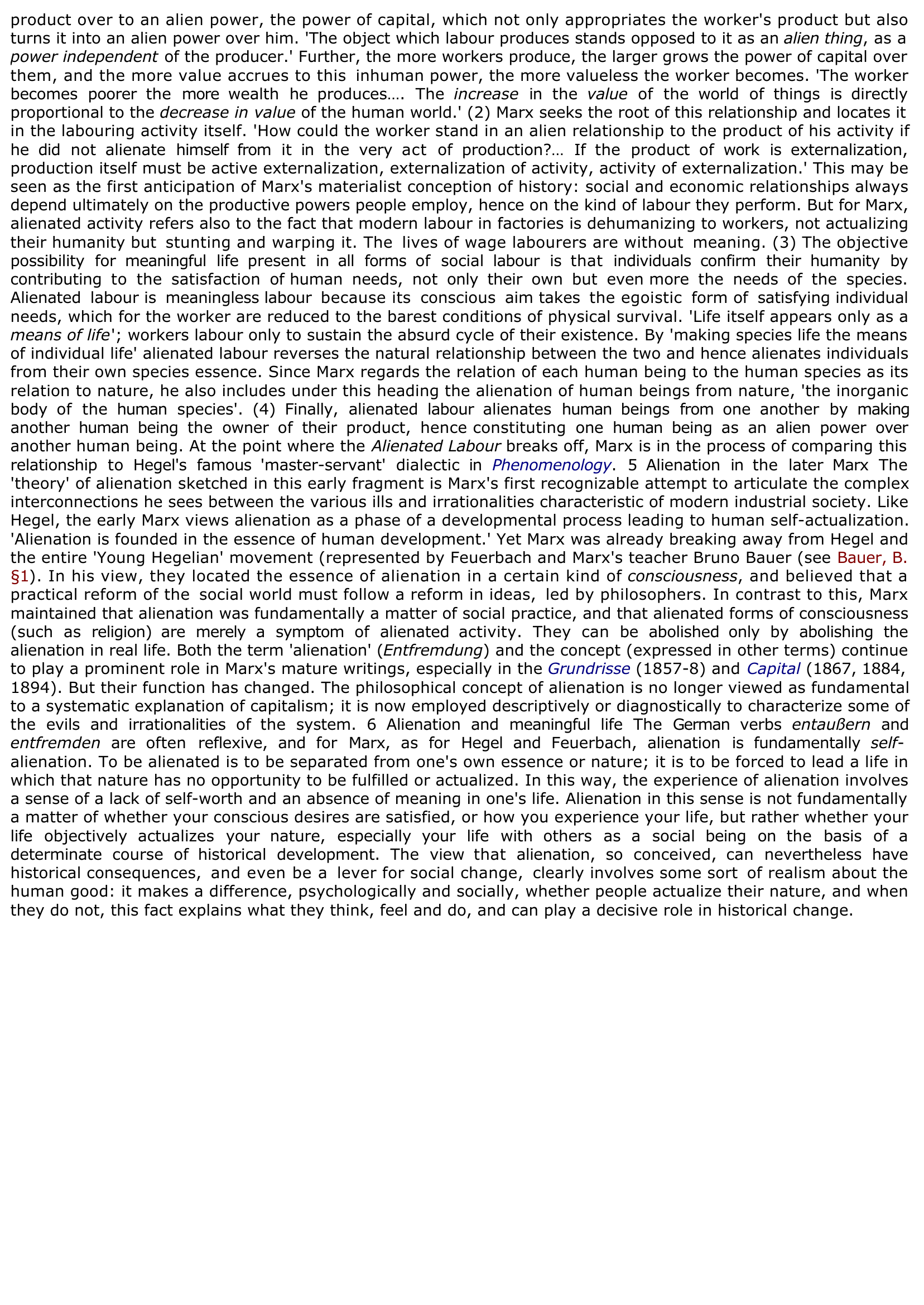Alienation
Publié le 15/01/2010
Extrait du document
«
product over to an alien power, the power of capital, which not only appropriates the worker's product but alsoturns it into an alien power over him.
'The object which labour produces stands opposed to it as an alien thing , as a power independent of the producer.' Further, the more workers produce, the larger grows the power of capital over them, and the more value accrues to this inhuman power, the more valueless the worker becomes.
'The workerbecomes poorer the more wealth he produces….
The increase in the value of the world of things is directly proportional to the decrease in value of the human world.' (2) Marx seeks the root of this relationship and locates it in the labouring activity itself.
'How could the worker stand in an alien relationship to the product of his activity ifhe did not alienate himself from it in the very act of production?… If the product of work is externalization,production itself must be active externalization, externalization of activity, activity of externalization.' This may beseen as the first anticipation of Marx's materialist conception of history: social and economic relationships alwaysdepend ultimately on the productive powers people employ, hence on the kind of labour they perform.
But for Marx,alienated activity refers also to the fact that modern labour in factories is dehumanizing to workers, not actualizingtheir humanity but stunting and warping it.
The lives of wage labourers are without meaning.
(3) The objectivepossibility for meaningful life present in all forms of social labour is that individuals confirm their humanity bycontributing to the satisfaction of human needs, not only their own but even more the needs of the species.Alienated labour is meaningless labour because its conscious aim takes the egoistic form of satisfying individualneeds, which for the worker are reduced to the barest conditions of physical survival.
'Life itself appears only as ameans of life '; workers labour only to sustain the absurd cycle of their existence.
By 'making species life the means of individual life' alienated labour reverses the natural relationship between the two and hence alienates individualsfrom their own species essence.
Since Marx regards the relation of each human being to the human species as itsrelation to nature, he also includes under this heading the alienation of human beings from nature, 'the inorganicbody of the human species'.
(4) Finally, alienated labour alienates human beings from one another by makinganother human being the owner of their product, hence constituting one human being as an alien power overanother human being.
At the point where the Alienated Labour breaks off, Marx is in the process of comparing this relationship to Hegel's famous 'master-servant' dialectic in Phenomenology .
5 Alienation in the later Marx The 'theory' of alienation sketched in this early fragment is Marx's first recognizable attempt to articulate the complexinterconnections he sees between the various ills and irrationalities characteristic of modern industrial society.
LikeHegel, the early Marx views alienation as a phase of a developmental process leading to human self-actualization.'Alienation is founded in the essence of human development.' Yet Marx was already breaking away from Hegel andthe entire 'Young Hegelian' movement (represented by Feuerbach and Marx's teacher Bruno Bauer (see Bauer, B. §1).
In his view, they located the essence of alienation in a certain kind of consciousness , and believed that a practical reform of the social world must follow a reform in ideas, led by philosophers.
In contrast to this, Marxmaintained that alienation was fundamentally a matter of social practice, and that alienated forms of consciousness(such as religion) are merely a symptom of alienated activity.
They can be abolished only by abolishing thealienation in real life.
Both the term 'alienation' ( Entfremdung ) and the concept (expressed in other terms) continue to play a prominent role in Marx's mature writings, especially in the Grundrisse (1857-8) and Capital (1867, 1884, 1894).
But their function has changed.
The philosophical concept of alienation is no longer viewed as fundamentalto a systematic explanation of capitalism; it is now employed descriptively or diagnostically to characterize some ofthe evils and irrationalities of the system.
6 Alienation and meaningful life The German verbs entaußern and entfremden are often reflexive, and for Marx, as for Hegel and Feuerbach, alienation is fundamentally self - alienation.
To be alienated is to be separated from one's own essence or nature; it is to be forced to lead a life inwhich that nature has no opportunity to be fulfilled or actualized.
In this way, the experience of alienation involvesa sense of a lack of self-worth and an absence of meaning in one's life.
Alienation in this sense is not fundamentallya matter of whether your conscious desires are satisfied, or how you experience your life, but rather whether yourlife objectively actualizes your nature, especially your life with others as a social being on the basis of adeterminate course of historical development.
The view that alienation, so conceived, can nevertheless havehistorical consequences, and even be a lever for social change, clearly involves some sort of realism about thehuman good: it makes a difference, psychologically and socially, whether people actualize their nature, and whenthey do not, this fact explains what they think, feel and do, and can play a decisive role in historical change..
»
↓↓↓ APERÇU DU DOCUMENT ↓↓↓
Liens utiles
- PSYCHANALYSE: ALIÉNATION (alienation)
- La notion d'ALIENATION en philosophie.
- Autrui n'est il qu'une source d'alienation ?
- ALIÉNATION (Alienation)
- PHILIPPE PINEL : TRAITE MEDICO-PHILOSOPHIQUE SUR L'ALIENATION MENTALE (Résumé & Analyse)

































